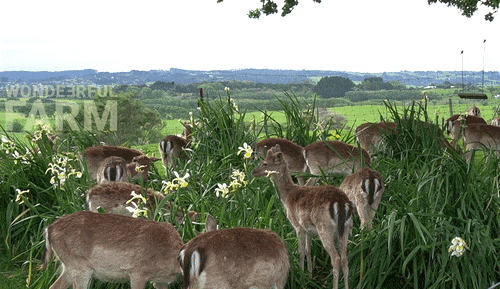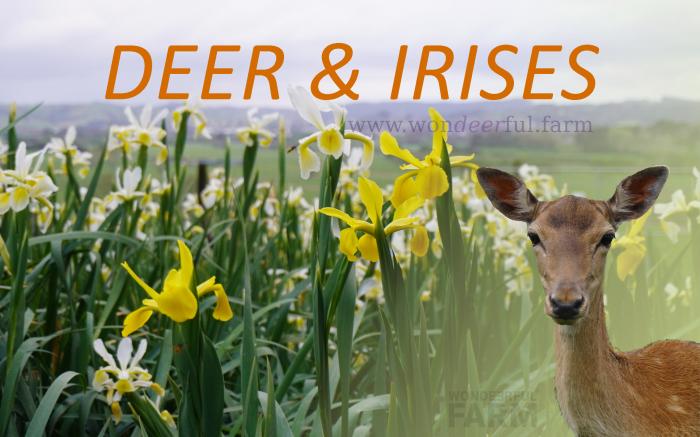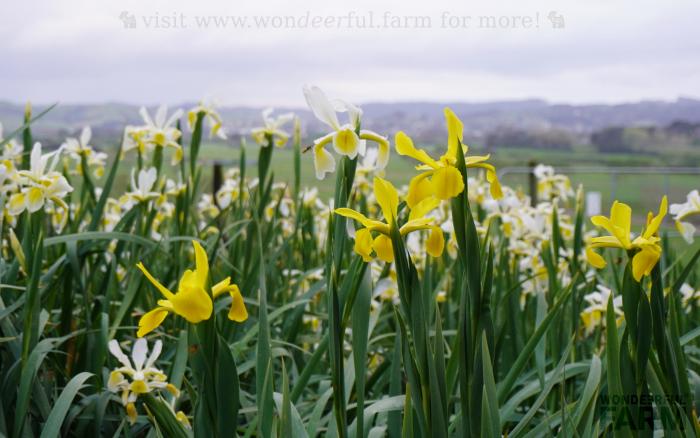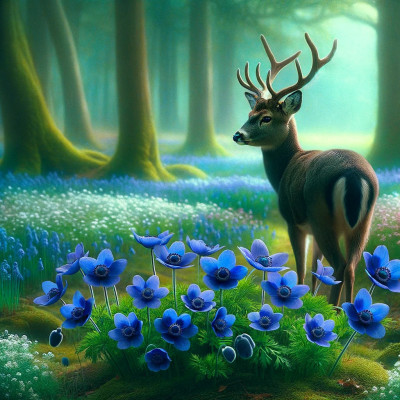Do Deer Eat Irises?
» Deer stories » Deer resistant plants » Do Deer Eat Irises?Plant type: perennials
Deer resistant: yes
Our plant hardiness zone:
New Zealand: subtropical
U.S. Zone 10b
An iris is a type of flowering plant that belongs to the family Iridaceae. It's famous for its showy flowers, often displaying a distinctive shape and intricate patterns that catch our attention. The name "iris" is derived from the Greek word for "rainbow," which perfectly captures the wide range of colors that these flowers can exhibit. BTW, another member of Iridaceae family is Freesia.
Irises' stunning appearance, low maintenance requirements, extended blooming periods, versatility in garden design and naturalizing ability are without a doubt main advantages of growing these perennial flowers. But what about deer resistance? Well, irises score very highly on that scale. Our ~ 35" (1 metre) tall irises occupy parts of some of our deer paddocks and they manage to co-exist perfectly with our animals.
Can Deer Damage Your Iris?
A related question though is, can deer damage iris plants in other ways. You know, when deer attack trees, they do not only eat fruits or foliage, they can also scrap the bark off or break lower branches. For bucks, any semi-sturdy tallish plant is like a potential punching bag, they sometimes like playing with them. So our deer have sometimes been observed trying to 'defeat' irises like that, but iris plants just bounce back. Some cosmetic damage might occur if a deer decides to bed in these tall plants. Most often though, they will sit down just in front of them, so irises provide a cover from their back. This makes deer feel safer and also, if we're talking thick rows of irises, works as a windbreak.
So long story short, while you may witness deer making use of these versatile plants in some ways, this is nothing 'life-threatening' for the irises. They even survive such trampling invasions by fawns:

Why Do Deer Avoid Irises in Their Diet?
Despite being overall not picky eaters, deer still have some standards! They usually skip on iris plants because they must find find them a bit toxic or just yucky. It could be their smell, or taste, or texture, or all of the tree combined. With plants like Foxglove, for example, the answer is, of course, that they're toxic. Irises are not as highly toxic, but can still cause mild issues for animals if consumed in significant amounts. So why risk it? Deer just avoid these plants. Also, irises begin flowering at the time when there is usually plenty of more palatable plants available and deer go for yummier options, like hostas or roses.
When Deer May Munch on Iris
- Hunger. While irises aren't typically on the critters' menu, when other food sources are scarce, they may resort to consuming iris.
- Fawns. We've seen younger animals take a small bite to sample the plants, when they are first learning what is and is not edible. But they walk away soon.
- Tender seedlings. Also, quite likely younger irises would be more vulnerable than established plants. Similarly to how our sage was near demolished initially, but a year later the same plants were of no interest to our deer.
What Iris Varieties are Deer Resistant
Whether we're talking Dutch or bearded iris, Japanese or Siberian iris, they all appear to be deer resistant.
I've been trying to figure out which ones we have inherited here in our garden and deer paddocks, because I've never sawn them, but I can't be 100% sure. They kind of look like a beardless variety? Very tall, white with yellow tinge or yellow flowers:
Google image search thinks it's a narcissus but I've transplanted them myself and they have rhyzomes not bulbs. (Many people call Iris rhyzomes 'bulbs' but they're not round, they're like thick roots, a bit like ginger or horseradish.) Anyway, can't take a new, closeup photo of flowers now as they've stopped blooming (it's summer in New Zealand). Hopefully will ammend this post at some point later.
Meanwhile, if it's the right season for planting these hardy perennial flowers where you are, consider purchasing some online through our affiliate link below and support this website at no additional cost to you:
Last modified 03 December 2023 at 10:38
Published 01 December 2023
Add your comment
Plants alphabetically
More «Deer resistant plants» stories
Do Deer Eat Peas? (We've tested!)
As beginner gardeners, we've tried to grow our first snap pea plant this year and it was a success! We've grown a huge vine with lots of pods in the end. How did our deer react to this garden pea plant?
read more...
Do Deer Eat Tomatoes? Insights from Deer Farmers
We farm deer and grow some tomatoes, so here's the answer to your question of whether deer attack tomato plants.
read more...
Are Anemones Deer Resistant?
While no plant is entirely deer-proof, blue poppy (De Caen) anemones seem to stand a good chance of surviving and thriving in a garden frequented by deer.
read more...
 '
'




